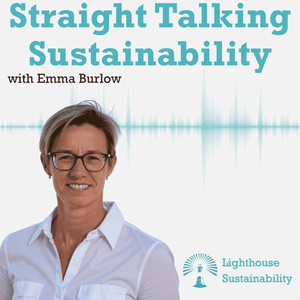Mind the Gap: How to Close the Target Action Gap and Turn Your Workforce Into Net Zero Champions
In this powerful and practical solo episode of Straight Talking Sustainability, host Emma Burlow tackles the most frustrating challenge facing corporate sustainability teams today: the target action gap. Companies have set ambitious net-zero targets, invested heavily in reporting and data collection, yet most employees remain disengaged and the sustainability team feels isolated, pushing a rock uphill alone.Drawing from her experience training over 1,500 people across major organisations, including BT, B&Q, Silent Night, Kenwood, and Openreach, Emma reveals why traditional sustainability engagement approaches (lunchtime webinars, team days, or brief e-learning modules) fail to create lasting change. The problem is not that employees do not care; they simply have never been given permission, confidence, or the minimum knowledge needed to act.Emma identifies the critical question every sustainability leader should ask their frontline staff: "On a scale of one to five, how confident do you feel talking about our net zero targets to customers or suppliers?" The typical response is ones and twos, revealing a confidence crisis that prevents progress regardless of how brilliant the strategy document looks. When employees run in the opposite direction from sustainability questions, the entire burden falls back on a handful of sustainability professionals trying to move targets forward in companies of thousands.The episode shares a compelling case study of a consumer products company with a 2040 net zero target struggling with staff disengagement and isolated sustainability teams unable to demonstrate progress. After implementing focused carbon literacy training, a senior commercial team member independently added a carbon stage gate to their business case process (worth millions of pounds in impact). Even more significantly, the sustainability leader overheard corridor conversations about carbon reduction weeks later, proving the training had created foot soldiers doing the work without prompting.Emma challenges the assumption that you need 100% (or even 50%) of your workforce engaged in sustainability. Instead, she focuses on identifying where the rub is: What is the one thing that will drive people to act? Is it customer pressure, supplier requirements, competitive threats, or regulatory mandates? Once you identify the pinch point and the critical roles (sales, procurement, marketing, operations), you can focus training on the minimum knowledge needed to move that specific rock downhill.The episode concludes with a practical 10-minute task: Ask three people in critical business roles how confident they feel discussing your net zero targets externally. Their responses (typically ones, twos, or fence-sitting threes) will reveal your exact gap. Emma argues that moving people from ones and twos to fours and fives creates the holy grail of sustainability implementation: employees taking action independently, building capacity across the business, and having conversations without the sustainability team present.This episode is essential listening for sustainability professionals experiencing burnout from trying to single-handedly transform their organisations, those struggling to demonstrate progress against targets, and leaders who recognise that their current engagement approach is not working but do not know what to try next.In this corporate sustainability implementation and training episode, you'll discover:Why net zero targets often create tumbleweed across organizations despite enormous reporting effortsThe three common gaps preventing sustainability action (value, knowledge, and target gaps)How carbon literacy training creates foot soldiers who independently drive change across businessesThe critical confidence question that reveals your...


